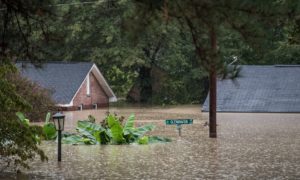The once-in-a-millennium catastrophic storm that descended upon the Carolinas took its toll on local residents, particularly Black communities who found themselves flooded out, without basic utilities and in many cases, homeless.
The catastrophic storm dumped 11 trillion gallons of rainfall, which is one-third the volume of Lake Tahoe, enough to end the drought in California, fill 130,370 Rose Bowls, and 636 million swimming pools, as USA Today reported. North Carolina received 5.2 trillion gallons, while South Carolina experienced a deluge of 5.8 trillion gallons.
The storm left 17 dead in both states, including 15 in South Carolina—the latest victim being a 30-year-old man recovered from a lake in Columbia. Billions of dollars in damage are estimated, while rivers still have yet to crest.
“We still have to be cautious,” Gov. Nikki Haley told reporters on Tuesday afternoon, as reported by KTLA.com. “The next 36 to 48 hours are going to be a time that we need to continue to be careful.”
Haley called the damage “disturbing” and said both state and federal officials were assessing the extent of the loss, as members of the National Guard were assisting with sandbagging and other operations to mitigate the situation.
“It’s hard to look at the loss we’re going to have,” she said. “This could be any amount of dollars.”
At least 11 dams have failed in the Palmetto State, with another 35 being monitored. Further, over 40,000 South Carolina residents are under a “boil water advisory” impacting 16 water systems, according to a spokesman for the S.C. Emergency Response Team.
Gov. Haley also said there have been 175 water rescues in her state so far, and more than 800 people were temporarily housed in shelters. At least nine people drowned and six died in traffic accidents, according to the South Carolina Department of Public Safety. In addition, some caskets were unearthed from cemetery plots and floated away in the floodwaters.

Flood-displaced residents rest at a temporary shelter at St Andrews middle school in Columbia, South Carolina. Photograph: Mladen Antonov/AFP/Getty Images
“We aren’t close to being out of the woods,” Mayor Steve Benjamin of Columbia said Tuesday, noting that additional dams could be in danger of breaking or being topped by water. “We still expect the water to start coming down from the Upstate, coming downhill to the Midlands.”
“Overnight, we had a break-in, so whatever was upstairs they came and took: TVs, jewelry, everything,” said Columbia resident Pamela Courts regarding the theft of her apartment, in an interview from local station WACH.
“Even though we lost everything and stuff got stolen, we can rebuild together and help each other and be each other’s backbones and carry each other through this time because we need each other,” said Juamaame Evins, who was trying to stay positive despite the dual hardships he had experienced of flood damage and theft.
Many local residents have sought shelter in one of the 33 shelters open in the state, as the Guardian reported.
“Some have lost their homes, some were evacuated ahead of the flooding,” said Red Cross spokesman Anthony Tornetta, noting that people were coming in droves to the shelters. “If there are 115 people in the shelter at the school, that’s 115 different stories. We’re there to listen to them and help them back on their feet. For many that will be a long process.”
“We don’t have power and we don’t have water, and we don’t know if we’ll get back and find our home has flooded too,” said Lakeysha Fair, who is staying in a Red Cross shelter with her nine-year-old daughter Shakira. “We don’t know how long we are going to be here. But we have our lives.”



